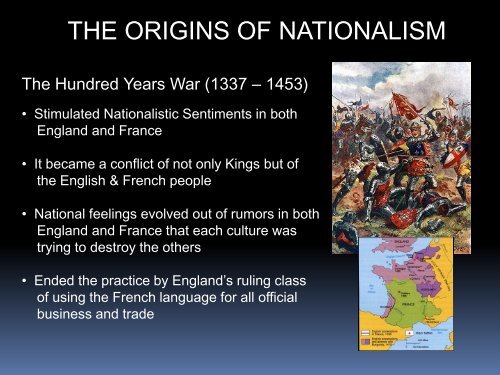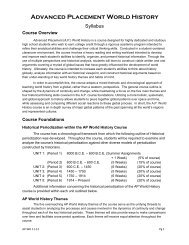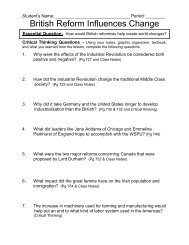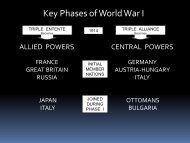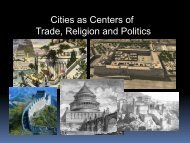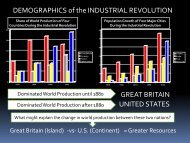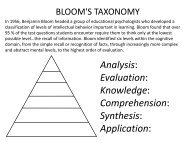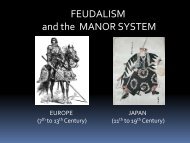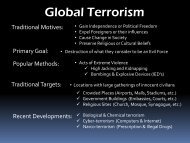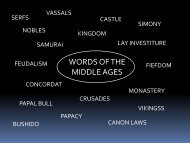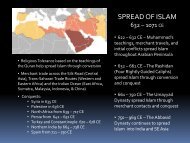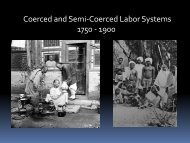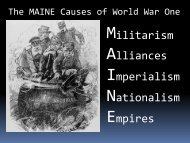Defining Nationalism
Defining Nationalism
Defining Nationalism
You also want an ePaper? Increase the reach of your titles
YUMPU automatically turns print PDFs into web optimized ePapers that Google loves.
THE ORIGINS OF NATIONALISM<br />
The Hundred Years War (1337 – 1453)<br />
• Stimulated Nationalistic Sentiments in both<br />
England and France<br />
• It became a conflict of not only Kings but of<br />
the English & French people<br />
• National feelings evolved out of rumors in both<br />
England and France that each culture was<br />
trying to destroy the others<br />
• Ended the practice by England’s ruling class<br />
of using the French language for all official<br />
business and trade
THE ORIGINS OF NATIONALISM<br />
Possible elements of a definition:<br />
• Patriotism - allegiance to a nation<br />
• Varying degrees of hatred for all other nations<br />
• A force that makes one willing to die for a nation<br />
• The belief, conviction, or principle that each national<br />
culture should be contained with defined state borders<br />
• Sometimes associated with a struggle for independence<br />
or a “National Movement”<br />
Underlying Belief:<br />
Nations are the main organizing group of humanity
Long-term causes of the rise of nationalism<br />
Modern Printing Press invented in 1451 by<br />
Johannes Gutenberg (1397-1468) and Johannes Fust<br />
Effects: Gutenberg bible printed in the Vernacular<br />
Increased Production of Literature<br />
Cheaper books (after 1500)<br />
Newspapers (after 1800)<br />
Increased Literacy<br />
Effects: Ideas for key Reforms begin<br />
Growth of literacy<br />
Spread of a Common Language<br />
Enlightenment Creates a more Secular Outlook<br />
Effects: Increased ideas of Human Potential<br />
Promotion of ideas of Individual Rights<br />
People begin to question Absolutism<br />
Separation of Church and State<br />
Mass Education Developed by Baron von Humboldt,1767-1835
Short-term Political Causes<br />
1. American Revolution:<br />
Effects: People are sovereign (not the king)<br />
Declaration of Independence<br />
U.S. Constitution<br />
2. French Revolution<br />
3. Partitions of Poland (1772, 1793, 1795):<br />
Effects: Russia, Austria and Prussia<br />
gobbled Poland up and it became<br />
THE NATION WITHOUT A STATE<br />
Effects: Development of the National Assembly<br />
Louis XVI is Executed<br />
Nation became sovereign
Political <strong>Nationalism</strong><br />
What makes a Nationality?<br />
Advocated loyalty to national group<br />
Led to intense rivalries among countries<br />
Important in unification<br />
Persecution of “others”<br />
• Common Language<br />
• Shared Customs & cultural traditions<br />
• Common Values<br />
• Shared Historical Experience<br />
Minorities demanded Independence<br />
Cultural <strong>Nationalism</strong><br />
Tried to deepen appreciation for unique<br />
historical experiences and cultural<br />
accomplishments<br />
Romanticism<br />
Reaction to ideologies of<br />
Enlightenment and rationality of<br />
Science
Responses to <strong>Nationalism</strong><br />
• Conservatives first tried to repress it at the Congress of<br />
Vienna (1814-1815)<br />
• Monarchs tried to use Censorship to prevent influences<br />
from Spreading<br />
• Attempts to Crush the Revolutions of 1848<br />
• Savvy politicians decided to exploit various Nationalist<br />
Movements<br />
• First a force for change, then becomes linked to<br />
conservatism<br />
• Eventually linked to imperialism
The British Empire becomes<br />
GREAT BRITAIN<br />
Expansions<br />
– North America (1600s)<br />
– Scotland (1707)<br />
– Ireland (1800)<br />
– Asia under East India<br />
Company (1857)<br />
– Africa (1800s)<br />
– Asia (1800s)
Italian Unification:<br />
1848-1870
Giuseppe Mazzini – “The Heart and Soul”<br />
Believed that Unification could<br />
only be achieved through a<br />
popular uprising<br />
“So long as you are<br />
ready to die for humanity,<br />
the life of your country is<br />
immortal.”<br />
“God has given you<br />
your country as cradle,<br />
and humanity as mother;<br />
you cannot rightly love your brethren of<br />
the cradle if you love not the common<br />
mother.”<br />
“The Young Italy Movement”
Camillo de Cavour “The Intellectual Mind”<br />
• Prime Minister of Sardinia<br />
• A Liberal – wanted to make<br />
Sardinia a model of progress,<br />
efficiency, and fair government<br />
for others to admire<br />
• Tried to improve the economy<br />
• Didn’t idealize war, but willing<br />
to use war to unify Italy –<br />
Crimean War (1855-1856)<br />
– Reorganized and strengthened<br />
Sardinian army<br />
• Main architect of Italian<br />
unification
Guisseppe Garibaldi – “The Sword”<br />
“Military Strategist”<br />
Leader of the Revolutionary<br />
“Red Shirts”
Italian<br />
Unification<br />
Map<br />
Declared: 1861<br />
Completed: 1870
ITALY UNIFIED!<br />
187O
German Unification:<br />
1848-1871
Otto von Bismarck<br />
“The Political Mind<br />
and Military Strategist”<br />
“Realpolitik”
Kaiser Wilhelm I<br />
“Regent, King, and<br />
Emperor”
Revolution of 1848 in Germany<br />
• Series of revolutions in German States<br />
Baden (27 February 1848)<br />
Austria (13 March 1848)<br />
Prussia (18 March 1848)<br />
Bavaria (20 March 1848)<br />
Poland (20 March 1848)<br />
Saxony (3 May 1848)<br />
• Frankfurt Parliament of 1848 (31 March – 18 May 1848)<br />
Offered crown of unified Germany to Frederick William IV<br />
He Turned it down – would not accept a crown “from the gutter”<br />
• Basic Rights of the German People<br />
Proclaimed in December 1848<br />
German States Restored
Conflicts to Establish the German Empire<br />
• 1848 – 1864 The First and Second Schleswig Wars<br />
“Secure Danish Territories along the Prussian Border”<br />
• 1866 The Austro-Prussian War (Seven Weeks War)<br />
“Fought between German Rivals to determine Supremacy”<br />
• 1870 – 1871 The Franco-Prussian War<br />
“Fight for the Balance of Power in Europe”
Jan.1871 Hall of Mirrors, Palace de Versailles (Near Paris)<br />
The Second German Reich is Proclaimed
GERMAN UNIFICATION<br />
German Reich 1871-1918
<strong>Nationalism</strong> Reforms Europe by 1871<br />
• Great Britain<br />
Unified in 1801<br />
• The French<br />
Republic<br />
Formed in 1804<br />
• The Kingdom<br />
of Italy formed<br />
with Unification<br />
of 1861<br />
• The German<br />
Empire Unified<br />
In 1871


